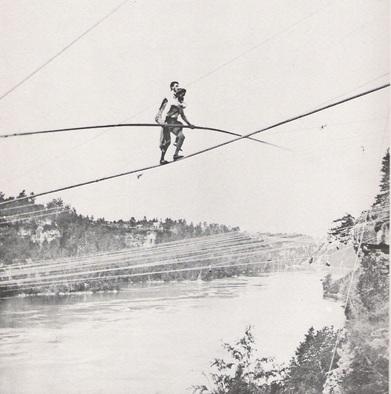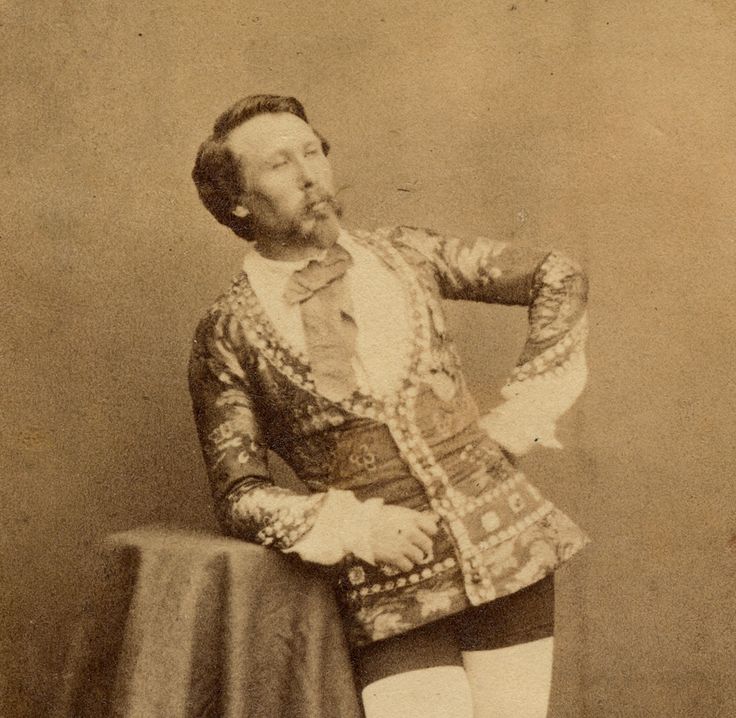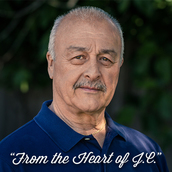 It was a bright clear morning when a large crowd gathered at the Niagara Falls to see the famous Blondin walk over it on a tightrope. The sun glistened on the cascading torrent of water as it rushed over the precipice. The world’s greatest tightrope walker briefly tested the taut strand that reached across to the opposite bank. Then he took his long pole, balancing himself expertly, started walking across. The crowd silently watched every step he took. Step by step he moved forward. The people on the bank reacted nervously to every sharp motion of the balancing pole. But their fears and anxieties were unnecessary, because the great Blondin not only went across to the other side of the Falls safely, but returned as well, to his starting point. Turning to the applauding audience he made a spectacular offer. He would cross the falls again, this time, with someone on his back. He then posed the question: “Who is willing to go?” No one rushed forward to accept the invitation. Pointing to a man, Blondin asked, “Do you believe that I am able to carry you across the falls?” “Yes sir,” replied the man. “Well, let’s go,” Blondin urged. “Not on your life!” And the man withdrew into the crowd. And so it went. One after another expressed confidence in the tightrope walker, but no one volunteered to let Blondin take him across. A young fellow in the back of the crowd made his way to the front and said, “I believe in you and I believe that you can carry me across to the other side of the Falls.” Blondin said, “Jump on,” and the young man climbed onto the expert’s back. Blondin stepped onto the rope, paused a moment, then slowly moved across the tightrope without difficulty. Together they made it safely to the other side. There were many in the crowd who believed that Blondin could do it, but there was only one who was willing to trust him to do it. This is called faith. Faith is more than an announcement of “I believe!” It is a verb. It requires action. It demands trust so strong that a person lives, moves, and has his being by it. It’s true that faith without works is dead and good for nothing. For more clarification, check out James 2:14-26. Faith and works are like the two chemical ingredients of salt, which we are told is composed of two poisons: sodium and chlorine. It is said, if we ingest either of the two poisons we will die. But if we combine them properly, we have sodium chloride, which is the common table salt that gives flavor to our food and indeed life and health to our bodies. And so, too, are faith and works inseparable. They go together like a hand in a glove. As gloves and surgical tools are valuable to a surgeon so are works, talents, and abilities valuable to a Christian’s faith. We have been given an order, “…Stir up the gift of God, which is in you by the putting on of my hands. For God hath not given us the spirit of fear; but of power, and of love, and of a sound mind.” For more info you can visit us at www.JoyChristianMinistries.com.  In Alice in Wonderland, at one point, Alice says to the Cheshire Cat, “Would you tell me, please, which way I ought to go from here?” “That depends a good deal on where you want to get to,” said the Cat. “I don’t much care where,” said Alice. “Then it doesn’t matter which way you go,” answered the Cat. And as it is with Alice so it is with us. Without an objective, we have nowhere to go and we wander aimlessly. Every person needs something to aim for. Call it a target or a goal or whatever you want, but it gives us purpose and drive. As a child, my parents taught me to save my money for that special thing I wanted. And it was amazing how a goal brought such tremendous excitement into my life. The problem with a lot of children today is their parents rob them of their incentive to be goal oriented by buying things for them. It’s heart breaking to see so many people wandering aimlessly through life without a goal or even incentives. The wisest man to ever live, before Christ, wrote, “Without a vision the people perish” (Proverbs 29:18). Being goalless is detrimental to our mental health. There’s the story of a man who approached a laborer who was laying bricks and asked him, “What are you doing?” The laborer answered, “Ah nothing…Just laying bricks.” The man then walked over to another bricklayer and asked, “What are you doing?” And the workman answered with pride, “I’m building a cathedral!” Both men were doing the same physical labor, but the first laborer was occupied with a task he wasn’t interested in while the other was excited with the goal. The second man had drive and purpose. Without a vision or purpose people just drift aimlessly through life. I want to share with you six keys to help attain your goal. (1) Seek for quality people in your life. Have friends who will sharpen your character and who want to see you succeed. Pursue those who encourage you to move to the next level in life. (2) Invest in yourself. Read good books, especially the Bible, and attend classes to expand your knowledge. Be faithful to God’s house and seek His will for your life. (3) Ask God for a courageous spirit. The enemy is plotting to keep you from attaining your goal; therefore, daily ask God to fill you with boldness and strength. Strength from God cannot be beaten. (4) Make your time count. Schedule your day and stick to it. Don’t be a time waster. Every day, you have eight hours to work, eight hours to relax, eight hours to sleep. Don’t let people waste your time. Make every minute count. (5) Seek God, and His blessings will seek you. Pursue what you are good at and what you like, because that could be God’s purpose for you. You came equipped with everything you need, just stir it up. (6) Have a teachable and humble attitude. A stubborn person is not teachable and will have a difficult time in life. Be pliable and remain teachable. For more info you can visit us at www.JoyChristianMinistries.com  It is said that the eleventh-century German king, King Henry III, who having grown tired of court life and the pressures of being a monarch, applied to a monastery to be accepted for a life of contemplation. The religious superior of the monastery, Prior Richard, is reported to have said, “Your Majesty, do you understand that the pledge here is one of obedience? That will be hard for you because you have been a king.” Henry replied, “I understand. The rest of my life I will be obedient to you, as Christ leads you.” “Then I will tell you what to do,” said Prior Richard. “Go back to your throne and serve faithfully in the place where God has placed you.” When King Henry, III died, a statement was written: “The King learned to rule by being obedient.” We too, like King Henry, often tire of our role and responsibility. But we need to be reminded that God has placed each of us in a particular place to be faithful. Be it as a plumber, accountant, teacher, mechanic, mother, father, pastor, or a minister, God expects us to be faithful where He has placed us. And so do others! Moses, the great leader, said: “Know therefore that the Lord thy God, He is God, the faithful God, which keeps covenant and mercy with them that love Him and keep His commandments to a thousand generations” (Deuteronomy 7:9). There is nothing more fulfilling than to know that God is faithful and He will never leave nor forsake us. This is also true for a husband, a wife, a child, a businessman, a friend or someone we put our trust in. It is a very solid feeling to know that someone who is close to us is dependable. Here’s some thought provoking questions: “Do you apply the same standards of trust and faithfulness to your life as you expect from your spouse, your mechanic, your pastor, or others?” Is your car faithful if it will only start once in a while? If your refrigerator will produce cold occasionally, is it faithful? If your hot water heater provides icy showers when least expected, is it faithful? Should you miss a couple of loan payments, does the bank consider you faithful? Does PG&E consider you a faithful customer if you are delinquent on your monthly bill? If you show up to God’s house on occasion, are you considered faithful? We expect faithfulness and reliability from others and from things that pertain to life. Should we not do unto others as we want them to do unto us? Think about how disappointing it is when a person, place or thing lets you down. And how aggravating it is when you are depending on their faithfulness and they are a no show. Now let’s reverse the role. You don’t want to be known as a bag of hot air, one who makes promises and does not follow through. Keep this in your memory bank: dependability and faithfulness are a quality much more precious than dollars. Remember the feeling of solidarity that comes from faithfulness then pass it on to others. For more info you can visit us at www.JoyChristianMinistries.com |
Pastor J.C. Myers, III
Pastor J.C. founded Joy Christian Ministries in 1992. He was Sr. Pastor at Joy Christian Ministries in West Sacramento, California from 1992-2016. He was succeeded by his 2nd son, Pastor Brandon Myers who had been under his father's ministry and teaching for 39 years. Archives
February 2017
Categories
All
|
COME RECEIVE ALL THAT GOD HAS FOR YOU!
Joy Church is a Jesus loving, Spirit filled, Christian church in West Sacramento, California. We exist to 'Lead people into a growing relationship with Jesus Christ.' We are a church that honors the Holy Spirit, a church that wins souls, a church that makes no apologies and feels no guilt for believing the Bible, and a church that is a blessing to your family and to this nation.
Joy Church is a Jesus loving, Spirit filled, Christian church in West Sacramento, California. We exist to 'Lead people into a growing relationship with Jesus Christ.' We are a church that honors the Holy Spirit, a church that wins souls, a church that makes no apologies and feels no guilt for believing the Bible, and a church that is a blessing to your family and to this nation.
|
|
© 2024 Joy Christian Ministries, Inc | All Rights Reserved | 916-375-0066
|
825 Sunset Ave. West Sacramento, CA 95605
|




 RSS Feed
RSS Feed

